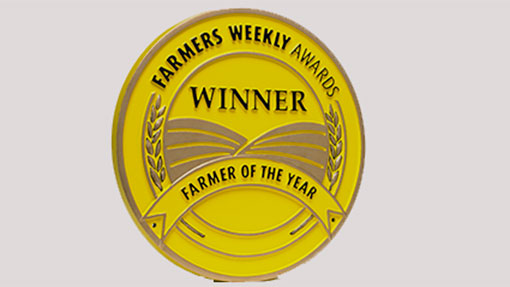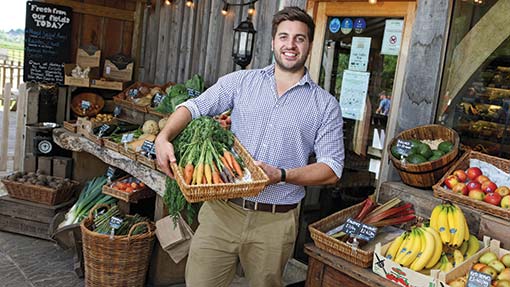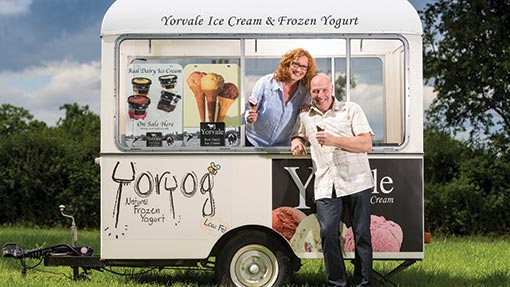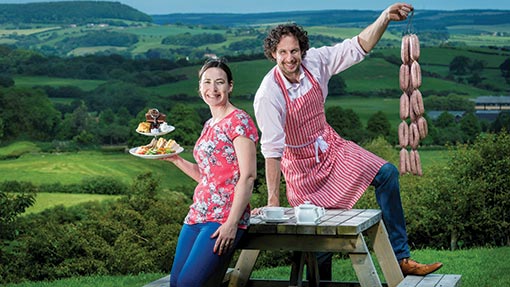2014 Farmers Weekly Awards Local Food Farmer finalists revealed

From a highly profitable ice-cream business, to a community-focused farm, to a foodie destination, our Local Food Farmer finalists have created three unique businesses.
Together they represent the best of farming and local food – passion for connecting with the community, quality local produce and intelligent marketing and customer focus.
Tom Bowles
Hartley Farm Shop and Café, Wiltshire

Still in his 20s and with no previous experience of business management, Tom Bowles has helped reinvent his family’s farm to create a thriving local food and community hub with a £1m-plus turnover.
Fresh out of university in 2006, Tom rejoined the 60ha family farm near Bradford-on-Avon in Wiltshire, just as his father Richard was getting out of pigs.
A self-proclaimed “foodie”, Tom wanted to cater for customers with a similar love of and excitement about local food and farming. While his father turned arable land to pasture and began building a beef herd, Tom invested £50,000 from his mother Kim’s livery business and opened a farm shop and café in 2008.
Foodie destination
To create a “destination” and “experience”, Tom has collaborated with other local producers, businesses and community groups. He rents 2ha to a kitchen-gardener, an area to community allotment holders and a renovated pig shed to a florist, microbrewery and coffee barista.
Visit Hartley Farm today and Tom’s vision, excitement and passion shine through. Fresh produce from the kitchen-garden and plants from the florist surround the farm shop. Inside, the shop and 70-seater café are light and modern. The cheese counter is packed with British and local cheeses, eggs come from the farm’s 150 laying hens, milk and ice cream from local dairy farms and ales from the microbrewery.
Farm facts
- 60ha, pasture, 30 beef cattle, two pigs, 150 laying hens
- £1.2m turnover (2013)
- Farm shop, café, butchery, kitchen-garden, kids’ café, farm trail, foraging courses, supper clubs, on-farm businesses
The butcher sells beef from the farm’s 30 Aberdeen Angus cattle, lamb from the bordering farm and chicken and pork from other local producers. In the café a team of chefs creates an imaginative daily menu using ingredients from the kitchen garden.
Tom’s attention to detail and brand communication are evident from the style of the buildings, to the signage, menu and knowledgeable staff. Tasters, “supplier-of-the-month” promotions, and recipe cards connect people and food, while multiple areas cater for different customers, including a candy-coloured kids café – Little Hartley Farm – an English flower garden – the Not-So-Secret Garden – and a farm trail.
Meet-the-suppliers events, supper clubs, barbecues, wild foraging courses and an online click-and-collect service are offered. Meanwhile Tom plans to extend the kitchen for cooking and butchery classes, share resources with a neighbouring farmer, extend the farm walk and develop more educational events.
Environment comes first
The environment is also top of the agenda. A £70,000, 50kW solar PV system has been installed and Tom has joined a local carbon group with the aim of being carbon neutral by 2050. Rainwater is harvested, natural stone walls have been restored, native trees planted and the farm is part of the Countryside Stewardship Scheme.
The beef cattle graze year-round on nitrogen-fixing clover pastures, which haven’t needed chemical fertilisers since they were first established, and a range of grass species provides a longer growing season.
It’s not hard to see why Hartley Farm recently won an award for best café in Bath and has totted up more than 10 awards, or why BBC Radio Wiltshire is returning for the second year to run a programme from the farm.
The business grew 25% last year, hitting a £1m turnover and 6% profit and is forecast to turn over £1.2m this year with 10% profit. About £190,000 has been invested so far, £70,000 of which was generated by the business.
Most impressive, though, is Tom himself, who at just 28 years old has led this development. Aware of himself as a manager and continually keen to learn and improve, he has worked with a business coach and is leading a local Farm and Retail Markets Association (Farma) group.
“I felt the biggest improvement to be made in the business was myself,” he says. The coaching has helped him delegate better to his 30 employees and enabled them to drive things forward, while a solid management structure and sharing of data means solutions and improvements are found as a team.
Focus on employees
A big believer in the importance of good employees, Tom has installed a rigorous recruitment process and week-long induction for new recruits. “They start off with more confidence, knowledge and a sense of value as a result,” he says.
Collection and analysis of data on monthly transactions, average spend, margins and new and returning customers have enabled him to build a better understanding of his business and customers and allowed him to strategically set monthly targets.
“I’ve learned and have a clearer vision of what a farm of our scale is about – it’s about reinventing,” says Tom. His reinvention has allowed a small family farm to thrive once again.
Lesley and Ian Buxton
Yorvale Ice Cream, North Yorkshire

Business savvy doesn’t even come close to describing it – husband-and-wife team Ian and Lesley Buxton are living proof of what commercial nous and hard work can achieve in dairy.
Small start
With just 36 cows on 32ha, they have built a highly profitable ice cream business and even supplied the Queen.
They started in the 1980s with a 23ha council tenancy on Fossfield Farm, just south of York. With a large number of tourists in the area, they began adding value to their milk and selling ice cream from a single van.
Since then they have developed the business into a high-tech operation with a £500,000 manufacturing site. The business grew 24% between 2011 and 2013 and the aim is to hit £1.8m turnover by 2016.
The ice cream factory is a far cry from their original building. It has grown from 50sq m with a 150-litre pasteuriser to more than 860sq m with a 2,000-litre pasteuriser, able to process in just two hours what the old site did in a day.
Milk production from the farm’s Friesian herd increased 14% last year, which all still goes into Yorvale ice cream. The Buxtons stopped selling to processors in 2005 and now plan to increase their herd to 50-60 cows in the next six months to meet demand.
Farm facts
- 36 dairy cows, 32ha
- £1.18m turnover aim by 2016
- £500,000 ice cream plant
- More than 40 ice cream flavours
- Processes up to 2,000 litres of milk a day
- Supplies local outlets
Up to 2,000 litres of milk is processed a day and Yorvale now includes more than 40 ice cream products, 10 sorbets and four frozen yoghurt flavours. Lesley and Ian have developed such an expertise that they produce gelato, ice-cream, frozen desserts and yoghurt for other companies, including Tiptree and St Helen’s.
Attention to detail
The couple have always developed their own products (often tested on their willing children) and continue to do so, using natural ingredients and extracts.
Their attention to detail and quality won them Small Business of the Year in the York Press Awards last year and Best Small Business in the Waitrose Awards.
Continuous checks and stringent biosecurity based on five critical control points have earned Yorvale a first-class food safety Grade 6 standard, which only 3% of all food manufacturing sites in the UK achieve, says Lesley.
By building a strong brand with its roots in farming, Lesley and Ian’s customer base now includes Saga cruises, regional listings in Waitrose, Booths, Tesco and Morrisons, Royal Ascot, local attractions, farm shops, hotels and catering outlets, with 50% of their sales in Yorkshire. To achieve this, Lesley learned product presentation skills and doggedly persevered to get listings and build a quality product. To market their ice cream they have collaborated with events and existing customers to produce bespoke flavours, including caramelised onion for the Queen’s dinner at Royal Ascot.
Their packaging is professional and refreshed when needed, while they engage with the public through social media, online competitions, tastings in farm shops and ice cream carts in York.
With an increasingly profitable business, Lesley and Ian have paid off their borrowings and funded £500,000 of business development from cashflow. They now employ nine staff year-round.
Reducing inputs
Since they stopped selling to processors, the farm is less intensive, says Lesley. The herd is milked twice a day following calving and once a day during the winter. By reseeding the pastures with a clover and grass mix, they have reduced the need for fertilisers.
Resource use is reduced through an abiatic cooler, which helps reduce energy in post-pasteurisation, and a heat-recovery system takes heat from the coldrooms to warm the washdown water. More energy-efficient cooler units have been installed, as well as a 370,000-gallon dirty water tank. The couple plan to install a 60kW solar PV system.
Lesley and Ian are also active members of their local community. Lesley is on the committee of a local hospice and Yorvale provided dessert for 550 people at its fundraising ball.
With demand growing rapidly, Lesley and Ian are adamant they will only ever use milk from their own farm. “We wouldn’t feel right not using our own cows’ milk,” says Lesley. “Without Yorvale, we wouldn’t be farming.”
Ashley and Nicola Tyson
Stepney Hill Farm, North Yorkshire

Few people could be said to work harder or give more to their community than husband-and-wife team Ashley and Nicola Tyson, owners of Stepney Hill Farm, near Scarborough in North Yorkshire.
When a small meatbox enterprise showed promise, Ashley took a risk and gave up a 222ha partnership and contracting business with his brother to develop the venture and pursue his passion.
This left Ashley and Nicola, three years ago, with 15 sheep, seven heifers, six sows, 27ha and very little capital. Since then they have worked tirelessly to build a successful farm butcher, meat wholesaler and farm with a big heart for community.
Grass-fed meat
With Nicola’s help, Ashley converted an old farm shed into a butchery and focused on producing quality grass-fed meat for the local market. Six months in, a competing butchery closed, so Ashley took its best staff and all its wholesale customers, including a £10,000/month contract.
Within another six months they’d won Scarborough’s Best Sausage competition, then trebled their turnover on their second Christmas and doubled it on the third.
To support the butchery, the Tyson family sacrificed the downstairs of their home by turning it into a 30-seater tearoom. Managed by Nicola, customers can now enjoy farmhouse breakfasts and generous afternoon teas with a picturesque view of the valley and the farm’s Herdwick, Wiltshire Horn and Swaledale sheep.
By collaborating with other businesses and groups in a mutually beneficial way, the Tysons have increased the offering to their customers and provided opportunities locally.
Renting a room to a local wholesale baker will provide the shop and café with a wider variety of freshly baked goods. A donation of allotment plots to three charities will help the rehabilitation of trauma and mental health sufferers and supply the shop and café with seasonal produce at lower prices.
Farm facts
- 64ha of grassland (27ha owned)
- 130 ewes, 25 rare-breed pigs, seven beef cattle
- Meat sold in farm butchers, café, wholesale, hog roasts
- On-site baker and charity-run allotments
Protection natural resources
A key part of the farm’s brand is its natural resource protection and use of different breeds, says Ashley. “We wanted to take the farm back to the old-fashioned ways to produce honest food. We’ve sown wildflowers and planted trees and we’re always looking to encourage more wildlife.”
The Shorthorn-cross cattle are outside 10 months of the year on clover and wildflower pastures and the resulting carcass has a rich, yellow fat. The rare-breed pigs include Kune Kunes, which require little feed and are suited to grazing all year, while curly-haired Mangalitsa pigs are loved by visiting children and ideal for pies.
Focus on community
Education and community are a genuine focus for Nicola and Ashley. “The community side of it is brilliant,” says Nicola. “The profit’s important, but we like to put a lot back in, too.” Ashley visits local schools regularly and is a parish councillor. The couple biked 200 miles and raised £1,500 for charity from an on-farm event last year, and attracted 1,800 people to their Open Farm Sunday this year.
But the Tysons haven’t stopped there. Their hog-roasts are fast becoming popular and this summer they will sell their hog-roast and breakfast meat packs at a four-day music festival. They are also looking into internet retailing, children’s parties, a play area and extending the farm shop.
With so much activity, they have taken on nine employees to help and Ashley checks incomings and outgoings closely every week. Starting with very little and still only three years into their business, the Tysons have grown their turnover from £93,000 in 2012 to just over £203,000 in 2013 and are projected to turn over £304,000 this year.
They have kept borrowings down by doing most of the work themselves, and with this covered the building of their house/café, butchers, shop, yard and drive.
Despite being so busy, customer care is paramount for the Tysons. Ashley personally delivers meat to all his wholesale and private customers and says he always will.
Sponsor’s message
 “This year’s local food farmer finalists have created three very different and exciting businesses, but what they each have in common is dedication, customer focus and an endless passion for quality local food from the farm. Each has worked extremely hard for their achievements.”
“This year’s local food farmer finalists have created three very different and exciting businesses, but what they each have in common is dedication, customer focus and an endless passion for quality local food from the farm. Each has worked extremely hard for their achievements.”
Pearce Hughes
Agricultural development manager
Find out more about the 2014 Farmers Weekly Awards
